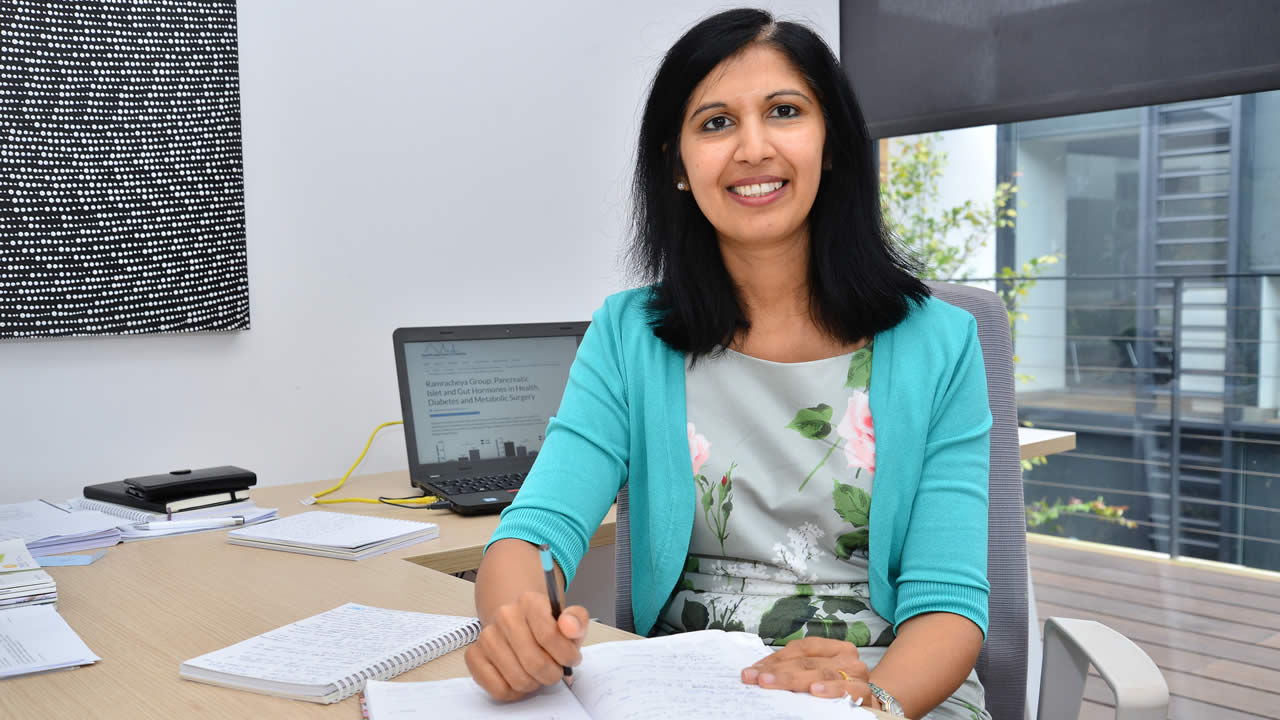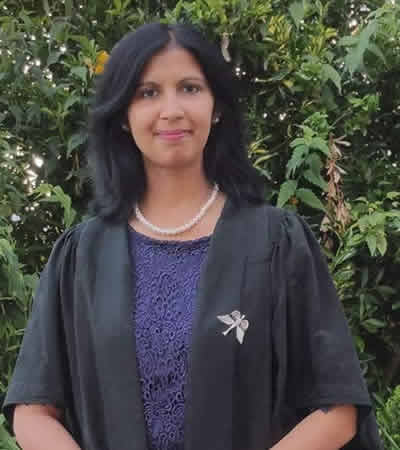
A biologist with over 18 years of experience in diabetes research, teaching and academic industry, Dr Reshma Jumaheer Ramracheya has published over 40 original papers in top academic journals, including Cell Metabolism, Nature Communications and Diabetes. A strong and determined lady, she is all set to revolutionize the scientific world. An inspiration for the young ladies who are willing to venture into the STEM field.
The world of biology or even science still consists of a higher percentage of men dominating in this field. But the career pathway and accomplishments of Dr Ramracheya have invaded this male space. With over 40 papers and award-winning presentations at multiple conferences, Dr Reshma Jumaheer Ramracheya has set the bar high. A Principal Investigator at the University of Oxford in translational research in type 2 diabetes, obesity and weight-loss surgery, Dr Ramracheya’s work explores the (dys)regulation of the hormones, insulin and glucagon secretion, and the role of incretins in health, obesity, diabetes and metabolic surgery.
Moreover, she is also a member of various academic committees, editorial boards and reviewer for top academic journals as well as international grant bodies. Dr Ramracheya is also a trained STEM ambassador and engages in high-impact outreach activities within the community and schools to raise awareness on the importance of Sciences in the curriculum as well as healthy living for a prolonged and disease-free life.
She states that Mauritius has a unique population of diverse ethnicity but with a plethora of metabolic conditions including impaired glucose tolerance, prediabetes in adults and children, high blood pressure and dyslipidaemia, gestational diabetes and obesity. “In my new endeavour, I seek to put the Mauritian heritage at the forefront of clinical research and engage in robust partnerships with pharmaceutical organisations and academic partners to advance fundamental research and drug discovery studies.” Her recent participation at the Third World Congress on Clinical Trials in Diabetes in Vienna whereby she presented “Mauritius, as the new kid on the block for clinical research in diabetes,” illustrates her commitment to promoting the island as a model for studying the pathophysiology of a disease which has crippled the nation for decades.
In my new endeavour, I seek to put the Mauritian heritage at the forefront of clinical research and engage in robust partnerships with pharmaceutical organisations and academic partners to advance fundamental research and drug discovery studies."
As a working mother of four children, life may be hard but Dr Ramracheya did not let her passion die. Despite having young children, with solid childcare and family support, she is able to attend a few international meetings every year and this helps to showcase the work of her lab at various platforms. “My three daughters and son think I have the coolest job in the world, working in a laboratory dressed in a white coat, goggles and gloves and with high tech equipment just like a geeky scientist!”
Her career pathway
Dr Ramracheya left Mauritius at the age of 18 to study Biology in England. She reveals that during her course and visits to Mauritius, she realized that practically every household in her village had at least one person afflicted with diabetes, including her own family. Consequently, she became very interested in the physiology of the disease, and decided to pursue a PhD in the field. “I was very lucky to be awarded a PhD research opportunity at King’s College London, with a remarkable two high-profile scholarships for the duration of my research. There, I studied the regulation of insulin secretion in human islets of Langerhans, and thus, began my career in the field of diabetes.”
Being at Oxford for the past 13 years has been a very rewarding experience for her. She explains that being a woman in science is not smooth sailing. “Like in other disciplines, I find that as a woman, I have to work a lot harder for the same recognition and opportunities as my male counterpart, and often miss out on career opportunities since social networking, the platform where opportunities are discussed, tends to happen out of working hours.”
Additionally, she states that the world of research is very small. “No matter how important research in human diseases is, finding the funds to keep the work going is one of the biggest challenges. There are many charities and grant bodies which have supported my work, including Diabetes UK and the Wellcome Trust. However, the funds are always limited and there is cut throat competition.”
Another challenge she puts forward is the mindset of people. “The treatment of diabetes within our local health service is rudimentary with just insulin, gliclazide and metformin, all of which are associated with side effects. Besides better control of blood glucose level, new medicines have very compelling benefits, such as documented evidence of weight loss and decreased food intake with positive impact on reduction of body weight, which is the main risk factor for diabetes. Many new medicines have been proven to reduce risks of cardiovascular events, and thus, overall quality of life. Yet, there is a lot of negative myths and resistance associated with the concept of clinical research on the island.”
A STEM ambassador
 Dr Ramracheya is also a STEM Ambassador. She underlines that she decided to train as a STEM ambassador because she wanted to inspire young girls to take science as a core subject at school. “Like in most parts of the world, science subjects in the UK are not so popular with girls. I have led many outreach activities within schools to change this mindset and have been described as a role model for young girls. In the context of Women in Science initiative, I have been invited to give talks to showcase that women can equally have a fulfilling career in science and research.”
Dr Ramracheya is also a STEM Ambassador. She underlines that she decided to train as a STEM ambassador because she wanted to inspire young girls to take science as a core subject at school. “Like in most parts of the world, science subjects in the UK are not so popular with girls. I have led many outreach activities within schools to change this mindset and have been described as a role model for young girls. In the context of Women in Science initiative, I have been invited to give talks to showcase that women can equally have a fulfilling career in science and research.”
She truly believes that there are many opportunities for young girls in research. “If you ask any of my daughters, they will tell you that they would like to be a scientist when they grow up! They are fascinated by science and intrigued by the role of genes in health and disease. My twin daughters were even pictured looking down a microscope at a cluster of cells in one of the Oxford newspapers recently.”
She underscores that it is a very enriching and rewarding career choice. “However, it is also true that opportunities for both young boys and girls in research are more limited in Mauritius. I would like to change this paradigm and have offered to collaborate with many institutions here. What I would like to do is to visit schools in Mauritius and run events to showcase the ‘fun’ aspects of science and inspire our girls, as well as promote healthy living to keep diabetes at bay. I think it is very important to educate our girls that besides medicine and dentistry, there are many other rewarding career choices in science, technology, engineering and Mathematics.”
Various awards won
Her distinguished career in the medical field is highlighted by the various prestigious awards she has won including the Diabetes UK RD Lawrence Fellowship, Senior Research Fellowship at Wolfson College, University Research Lecturer at the University of Oxford and Scientific Membership of the first UK Clinical Study Group for Prevention, targets and therapies for type 2 diabetes. “As I said, diabetes has been very close to my heart throughout my career. A major turning point in my life was when I was awarded a prestigious research fellowship from Diabetes UK in 2012, which enabled the establishment of my very own research lab within the Oxford Centre for Diabetes, Endocrinology & Diabetes department, which is a world-class teaching and research institution. Landmark studies have been conducted at this Centre, including the world famous UKPDS and genome wide studies.”
During this fellowship, her lab produced a high impact publication proposing for the first time a novel mechanism to explain the reversal of diabetes following weight-loss surgery. “This work was cited by the press, scientific journals as well as several diabetes organizations as a potential breakthrough in the treatment of diabetes. My team and I were the first to propose that a less studied gut hormone plays a critical role in diabetes reversal.”
Public Outreach Activities
Dr Ramracheya is a strong believer in engaging the public in fundamental and clinical research. She argues that scientific breakthroughs, which happen behind the closed doors of a laboratory, are insignificant until they can benefit human health. Every year Reshma and her team dedicate at least one day away from the lab to showcase the research that her group is doing. She runs activities to sensitive the public on the dangers of diabetes and how to keep it at bay at yearly events such as the Oxford Curiosity Carnival, the Science Fair and Community Festivals. More recently, in the context of World Diabetes Day, Reshma organized and championed a two-day event in Mauritius whereby she got kids interested in dressing up as a scientist for the day and weighing out the amount of hidden sugar in their favourite snacks and drinks, but importantly, how long they ought to exercise for to burn off the calories.
 J'aime
J'aime














